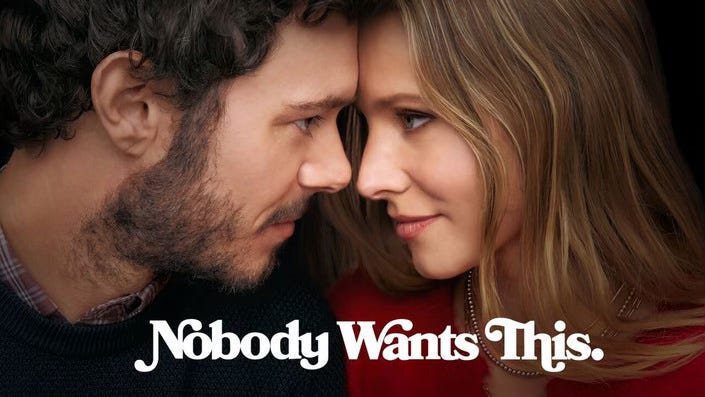Icks, WAGs and Change
Some thoughts about the TV show 'Nobody Wants This' (no spoilers)
I think that the only powerful emotion that can elevate or destroy a person is love. This story has been told several times in different ways, with different characters, but the summary has always been the same. Love transforms people in unimaginable ways.
There’s always a strong individualistic streak that wants to protect our true self and personality based on logic, morality and theories. But all of this often crumbles in the face of love.
‘Nobody Wants This’ is yet another TV show that captures this strange process of transformation.
Change (but to what extent?)
A Jewish priest called Noah discontinues an incompatible relationship, meets a podcaster at a party and falls in love. The question of compatibility is not explored thoroughly from a rational perspective but the story flows with dramatic pace and exposes different aspects of ‘love’.
There are several ways to break down this show, but the exercise would reveal spoilers. But it definitely makes you feel triumphant and sad several times.
To what extent should either of these characters change to make ‘love’ work? This question drives the story and keeps the viewer hooked till the last episode.
This is not a unique or a mind-blowing question. But there is no answer to such questions. That’s probably a good thing because there would be no drama in the world if we can answer that.
Vulnerable Male Characters and ‘Icks’
The show excels in portraying vulnerable male characters who can express emotions and be flawed. There are no muscular macho men who’re always winning.
The male characters hide truth and their doubts at several points. But they are able to clarify these and express what they feel to the more emotional female characters in the show.
This is probably a good change, though I don’t claim to have done a huge survey of all male leads in popular cinema/TV shows. But I can vouch for the fact that men often find it very hard to break the serious-stoic-strong dude trope.
A guy making mistakes often gives the female characters an ‘ick’. This is supposed to be a cool term coined to explain why women leave relationships. But it also demonstrates that some kind a reassurance and vulnerability from a man’s side can address the ‘ick’.
Female Competition and WAGs
Though one might be familiar with female rivalries, friendships and power-struggles, this show brings out these dynamics in a raw and visible manner. This not only fires up the viewer, but also helps him/her to explore these dynamics further.
WAGs is a new term that one might come across in this show. Apparently WAGs is short of ‘wifes and girlfriends’.
It’s interesting how the female character needs to be liked and approved by the spectators of a relationship who have no clue about complex dynamics between the couple.
However, their participation somehow spices up the drama and makes the relationship ‘work’. The approval ratings sought from spectators enable the couple in the show to work together and solve problems, bringing them closer in the process.
In spite of the uneasiness that can be caused by spectators of a relationship, one can’t deny the drama that brews due to competition for power among various female characters who surround a man in demand.
Yay or Nay?
There’s plethora of shows on the internet these days and one can always argue for or against a show.
I watched this mostly because of FOMO and curiosity. I started off on a very critical note but I ended up enjoying it after the fourth episode.
I wouldn’t call it yet another romcom, though it has all ingredients of one. But I recommend it for those who want to explore the fundamental question I mentioned above.
To what extent should individuals change to make ‘love’ work?


